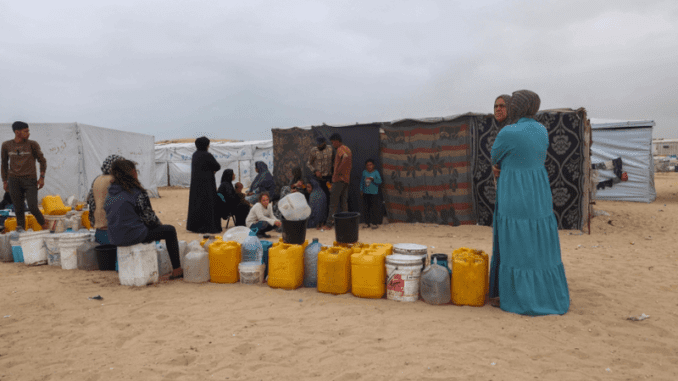
After Hamas rejected any agreement that would not put an end to the conflict in Palestinian territory and charged Israeli Prime Minister Benjamin Netanyahu with “personally hindering” a peace effort, negotiations to reach a Gaza truce were anticipated to continue on Sunday.
According to information made public by Britain, negotiators hoping to end the catastrophic seven-month conflict have suggested a 40-day ceasefire and the swap of Palestinian inmates for hostages.
A senior Hamas source familiar with the negotiations told AFP that there would be “a new round” of talks on Sunday after US, Qatari, and Egyptian mediators met with a group from Hamas on Saturday in Cairo.
A senior Hamas official insisted late on Saturday that the organization would “not agree under any circumstances” to a truce that did not expressly include a total end to the war, including Israel’s withdrawal from Gaza. Both sides blamed the other for the impasse in the discussions.
Requesting to remain anonymous, the official denounced Israeli attempts to negotiate a hostage-release agreement “without linking it to ending the aggression on Gaza”. He charged that Netanyahu’s “personal interests” were “personally hindering” efforts to reach a truce.
Prior to this, a senior Israeli official stated that by holding onto its demand for an end to the war, Hamas was “thwarting the possibility of reaching an agreement”.
In Jerusalem, the official told AFP that Israel has not consented to any assurances regarding the end of the conflict.
After months of sporadic negotiation, mediators have been unable to bring about a fresh ceasefire similar to the one that last November witnessed the release of 105 hostages in exchange for Palestinians detained by Israel.
Prior talks broke down partly because of Hamas’s insistence on an indefinite cessation of hostilities and Netanyahu’s constant threats to destroy the organization’s fighters in the now-crunching southern city of Rafah, which is overrun with displaced residents.
Israel has not yet dispatched a representative to Cairo. The Israeli official stated that only “positive movement” on the framework proposal would prompt it to act.
An actual accord will likely require protracted and difficult discussions, the official continued.
‘Full-blown famine’
After Hamas launched an unprecedented strike on Israel on October 7, which killed over 1,170 people—mostly civilians—an AFP count of Israeli official data shows that the conflict began.
The health ministry of the Hamas-run enclave reports that at least 34,654 individuals have died in Gaza as a result of Israel’s retaliatory offensive against the group, the majority of them were women and children.
A “full-blown famine” has been declared by the UN in the northern Gaza region.
In an interview that was released on Friday, Cindy McCain, the executive director of the World Food Programme, stated, “There is famine, full-blown famine in the north and it’s moving south.”
The 2.4 million people who live in the besieged Palestinian region of the Gaza Strip saw a very little improvement in food availability, according to a statement released by the World Health Organization on Friday.
More than 70% of Gaza’s residential buildings, according to the UN, have been totally or partially damaged, and reconstruction will need an effort not seen since the end of World War II.
US Secretary of State Antony Blinken stated late Friday that Hamas is “the only thing standing between the people of Gaza and a ceasefire,” therefore accepting a truce agreement with Israel should be “no-brainer” for them.
There is growing domestic pressure on US President Joe Biden to get greater concessions from Netanyahu’s administration about how it is handling the war.
Biden’s Democratic Party members, numbering 88, signed a letter expressing grave concerns over Israel’s “deliberate withholding” of help for Palestinian civilians and urging Biden to think about suspending military shipments until Israel’s behavior improves.
Israel has allowed additional supplies to enter Gaza in recent days at the US’s request, but according to UN agencies, this hasn’t stopped the famine from spreading.
The ‘bloodbath’ in Rafah
The possibility of an attack on Rafah has caused increasing worry on a global scale.
On Saturday, a top Hamas leader declared that Israel would take “full responsibility” for its insistence on entering Rafah rather than stopping its attack.
According to the WHO, 1.2 million people—or half of the population of the Gaza Strip—are taking refuge in Rafah.
There was a warning on Friday that “a full-scale military operation in Rafah… could lead to a bloodbath” from Tedros Adhanom Ghebreyesus, the head of WHO.
In the already unstable occupied West Bank, where Israel claimed on Saturday that its troops had killed five Palestinian “terrorists” after a 12-hour siege near Tulkarem, the war in Gaza has also contributed to an increase in violence.
Alaa Adib, the leader of Tulkarem, was among the three fighters who died, according to the Ezzedine al-Qassam Brigades, the armed branch of Hamas.
An AFP count indicates that since October 7, Israeli troops or settlers have murdered at least 496 Palestinians in the region.
Protests against the war by students have erupted throughout North America and Europe; since mid-April, protesters have gathered on at least forty US university campuses.
A number of student sit-ins have been violently broken up by police in recent days, including one at New York University that was called off by university officials.
More than 200 demonstrators were taken into custody as hundreds of police broke up a camp at the University of California, Los Angeles.
Leave a Reply